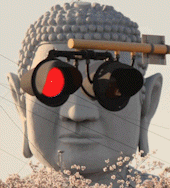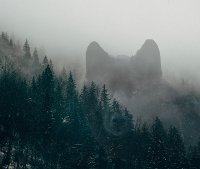| Hot Topics | |
|---|---|
Tohoku Earthquake, Tsunami and Nuclear Disaster!!!
Re: Tohoku Earthquake, Tsunami and Nuclear Disaster!!!
higher readings than usual...
normal low: 0.09
normal high: 0.15
today: 0.25
the counter in the car with its default alarm value for ukraine (0.30) rang once.
normal low: 0.09
normal high: 0.15
today: 0.25
the counter in the car with its default alarm value for ukraine (0.30) rang once.
-

Coligny - Posts: 21822
- Images: 10
- Joined: Sat Jan 17, 2009 8:12 pm
- Location: Mostly big mouth and bad ideas...
Re: Tohoku Earthquake, Tsunami and Nuclear Disaster!!!
Coligny wrote:higher readings than usual...
normal low: 0.09
normal high: 0.15
today: 0.25
the counter in the car with its default alarm value for ukraine (0.30) rang once.
The battery in my geiger counter is dead but the Safecast Office Tokyo reads 0.102 uSv/hr or old-sʞool 34 CPM, which is slightly higher than my house average of 32 CPM.
http://realtime.safecast.org/
Japan, Tokyo, Shibuya, Safecast Office 0.105 uSv/hr
3 mins ago
2016-08-08T22:54:00.000Z 0.105
As you can see the Safecast readings from "1 year ago" are ridiculously wrong. I just double checked with my otaku buddy in Hino (far
You do not have the required permissions to view the files attached to this post.
-

Taro Toporific - Posts: 10021532
- Images: 0
- Joined: Tue Sep 10, 2002 2:02 pm
Re: Tohoku Earthquake, Tsunami and Nuclear Disaster!!!
Since when is Hino "far north Tokyo?"
Sent from my iPhone using Tapatalk
Sent from my iPhone using Tapatalk
Faith is believing what you know ain't so. -- Mark Twain
-

Samurai_Jerk - Maezumo
- Posts: 14387
- Joined: Mon Feb 09, 2004 7:11 am
- Location: Tokyo
Re: Tohoku Earthquake, Tsunami and Nuclear Disaster!!!
Samurai_Jerk wrote:Since when is Hino "far north Tokyo?"
Ok, ok, the end-of-the-earth, hic sunt dracones, far west Tokyo.
-

Taro Toporific - Posts: 10021532
- Images: 0
- Joined: Tue Sep 10, 2002 2:02 pm
Re: Tohoku Earthquake, Tsunami and Nuclear Disaster!!!
high radioactive concentration areas are watersides of river, lake, swamp and ditches.
its meaningless to measure the amount of radiation in the air, except in fukushima area.
its meaningless to measure the amount of radiation in the air, except in fukushima area.
-

Takechanpoo - Posts: 4294
- Images: 4
- Joined: Fri Oct 06, 2006 10:47 pm
- Location: Tama Prefecture(多摩県)
Re: Tohoku Earthquake, Tsunami and Nuclear Disaster!!!
Takechanpoo wrote:high radioactive concentration areas are watersides of river, lake, swamp and ditches.
its meaningless to measure the amount of radiation in the air, except in fukushima area.
On what evidence do you base this?
“To learn who rules over you, simply find out who you are not allowed to criticize.”
“I know not with what weapons World War III will be fought, but World War IV will be fought with sticks and stones.” ― Albert Einstein
-

Russell - Maezumo
- Posts: 8580
- Images: 1
- Joined: Fri Aug 13, 2010 11:51 pm
Re: Tohoku Earthquake, Tsunami and Nuclear Disaster!!!
http://wpb.shueisha.co.jp/2016/03/24/62840/
http://wpb.shueisha.co.jp/2016/03/25/62842/
pond, swamp and ditches are highly contaminated with radioactivity.
You do not have the required permissions to view the files attached to this post.
-

Takechanpoo - Posts: 4294
- Images: 4
- Joined: Fri Oct 06, 2006 10:47 pm
- Location: Tama Prefecture(多摩県)
Re: Tohoku Earthquake, Tsunami and Nuclear Disaster!!!
Russell wrote:Takechanpoo wrote:high radioactive concentration areas are watersides of river, lake, swamp and ditches.
its meaningless to measure the amount of radiation in the air, except in fukushima area.
On what evidence do you base this?
let me rephrase takechimp demonstration to highlight your mistake littul dutchman:
There is a lot of water in a swimming pool so it's meaningless to use charcoal for a bbq.
-

Coligny - Posts: 21822
- Images: 10
- Joined: Sat Jan 17, 2009 8:12 pm
- Location: Mostly big mouth and bad ideas...
Re: Tohoku Earthquake, Tsunami and Nuclear Disaster!!!
Take, those are all soil samples. While some samples are associated with water features and others not, you can make no statement about air samples or water samples based on that data.
-

wagyl - Maezumo
- Posts: 5950
- Images: 0
- Joined: Thu Mar 17, 2011 11:08 pm
- Location: The Great Plain of the Fourth Instance
Re: Tohoku Earthquake, Tsunami and Nuclear Disaster!!!
the radiation dose in the air has been almost unchanged at least in greater tokyo area.
why do you need to worry about it?
why do you need to worry about it?
-

Takechanpoo - Posts: 4294
- Images: 4
- Joined: Fri Oct 06, 2006 10:47 pm
- Location: Tama Prefecture(多摩県)
Re: Tohoku Earthquake, Tsunami and Nuclear Disaster!!!
You are the one who raised the issue about the "meaninglessness" of air readings. Which are they: unchanged, or meaningless, or changed as some posters seem to be suggesting? When asked to present backup for the meaninglessness, you presented a table of soil sample readings.
Take, a conversation is comprised of a continued flow, reaction and further reaction.
A new tangent when a reaction seems inconvenient to you is not a conversation.
But then again, you never have been a conversationalist. Don't expect conversation in return.
Take, a conversation is comprised of a continued flow, reaction and further reaction.
A new tangent when a reaction seems inconvenient to you is not a conversation.
But then again, you never have been a conversationalist. Don't expect conversation in return.
-

wagyl - Maezumo
- Posts: 5950
- Images: 0
- Joined: Thu Mar 17, 2011 11:08 pm
- Location: The Great Plain of the Fourth Instance
-

Takechanpoo - Posts: 4294
- Images: 4
- Joined: Fri Oct 06, 2006 10:47 pm
- Location: Tama Prefecture(多摩県)
Re: Tohoku Earthquake, Tsunami and Nuclear Disaster!!!
-

Coligny - Posts: 21822
- Images: 10
- Joined: Sat Jan 17, 2009 8:12 pm
- Location: Mostly big mouth and bad ideas...
Re: Tohoku Earthquake, Tsunami and Nuclear Disaster!!!
Zombie radiation: Fukushima's poisonous fallout eating entire chunks of peoples' brains away, reaching California coast
Trustworthy, no doubt
Combined with the zika virus that the olympians will bring home, we will soon have shrink-heads with hole-brains. The typical salariman, so to speak
Natural News wrote:(NaturalNews) The Fukushima disaster has been out of the news cycle for more than a year now, but the radioactive fallout and its cascade of adverse effects is far from being just another page in the history books. Reports from around the world indicate that Fukushima radiation is still wreaking havoc on people's health, in some cases eating away human brains in some bizarre, zombie radiation apocalypse.
The Spanish newspaper, El Pais Semanal, reported back in May that Toru Anzai, 63, a former resident of Litate, Japan, a village in the Fukushima Prefecture, suffered a major heart attack and stroke several years after the reactor meltdowns. During Anzai's stay in the hospital, doctors realized that the frontal lobe of his brain had developed a hole, which they told him may have been caused by absorbing the radioactive isotope cesium, which was prevalent at Fukushima.
[...]
The Japanese government's continued downplaying of the disaster has created an even bigger disaster in terms of public health. Much like the former Soviet Union did in the aftermath of Chernobyl, Japanese officials have tried to pretend that the Fukushima disaster is over and done with, and that all that radiation has somehow vanished – poof!
[....]
Trustworthy, no doubt
Combined with the zika virus that the olympians will bring home, we will soon have shrink-heads with hole-brains. The typical salariman, so to speak
-

Grumpy Gramps - Maezumo
- Posts: 2204
- Joined: Mon Oct 14, 2013 2:22 am
- Location: 地獄の便所
Re: Tohoku Earthquake, Tsunami and Nuclear Disaster!!!
Well, at the very least, El Pais Semanal knows that the letter "L" does not appear in Japanese Romanisation, and that two "I"s can snuggle up together, and that there is a difference between upper case "I" and lower case "L"
Be warned that machine translation has a difficulty with remembering gender when going between English and Spanish
El señor Anzai tiene 63 años y deambula por la casa que abandonó hace cinco años en este pueblo con bolsas de plástico en los pies y las manos en los bolsillos de su anorak azul. Hoy vive realojado en unos bloques del Gobierno con otros vecinos. No le gusta ese sitio. Hace dos años tuvo un ataque al corazón y un infarto cerebral; el estrés y la sensación de inseguridad le afectaron. Sus secuelas empezaron siendo psicológicas. Pero en el hospital le encontraron un agujero en el lóbulo frontal del cerebro que le produjo una parálisis en el lado izquierdo del cuerpo. El médico le dijo que podía haberlo causado el cesio que absorbió durante tanto tiempo. “Nos engañaron con los niveles de radiactividad. Y las ayudas que nos han dado no sirven para nada. Lo he perdido todo: mi vida, mi trabajo, mis tierras, mis recuerdos… Estoy muy enfadado y cada vez que vengo aquí me derrumbo”.
Los relojes de pared de Toru Anzai, colgados todavía junto a un polvoriento calendario de 2011 en su casa deshabitada, se pararon poco después del accidente. Al mediodía había empezado a arar los campos de arroz familiares y dos horas más tarde la tierra comenzó a temblar. Anzai, un campesino con inquietudes científicas y tecnológicas, siempre desconfió de la central. Así que corrió hacia su casa y llenó varias garrafas de agua. Algo le dijo que no volvería a beber del grifo. Se encerró con sus cinco hermanos y solo dos días después, el 14 de marzo, escuchó el trueno de la explosión del reactor número 2. El viento no tardó en traer hasta Iitate un penetrante olor a hierro fundido mezclado con algo parecido al azufre que se pegaba en las fosas nasales. Por entonces, el monstruo de Fukushima liberaba ya enormes cantidades de componentes radiactivos formando una nube tóxica que volaba hacia la casa de Anzai en las montañas.
Pero el alcalde de Iitate insistió en que no había ningún riesgo para sus habitantes. Desconfiado por naturaleza, el señor Anzai compró su primer dosímetro el 18 de abril. “Made in China”, señala con cierto desdén. Le costó 500 euros, pero aportó una información valiosa. El lugar en el que él y sus hermanos llevaban durmiendo más de un mes desde el accidente acumulaba ya 6 microsieverts por hora (20 veces más del mínimo que ha fijado el Gobierno para realojar a los vecinos). La central había liberado a la atmósfera la radiación y los vertidos al mar alcanzaban las 700 toneladas. Anzai y el resto de vecinos de Iitate fueron la población que mayor exposición tuvo a la radiación.
Be warned that machine translation has a difficulty with remembering gender when going between English and Spanish
-

wagyl - Maezumo
- Posts: 5950
- Images: 0
- Joined: Thu Mar 17, 2011 11:08 pm
- Location: The Great Plain of the Fourth Instance
Re: Tohoku Earthquake, Tsunami and Nuclear Disaster!!!
Wow! The content accumulator which Grumpy Gramps linked has an ad for an insect repellant (to keep Zika mosquitoes away*), which actually contains NO CHEMICALS. I think these hollow brains have spread further and faster than we thought. Either that, or someone has been dipping in to the Hemp Hearts a little too often. I'll just buy some of their Chocolate Chia Pudding.
* But they wouldn't come, because Zika is not a breed of mosquito...
* But they wouldn't come, because Zika is not a breed of mosquito...
-

wagyl - Maezumo
- Posts: 5950
- Images: 0
- Joined: Thu Mar 17, 2011 11:08 pm
- Location: The Great Plain of the Fourth Instance
Re: Tohoku Earthquake, Tsunami and Nuclear Disaster!!!
wagyl wrote:Wow! The content accumulator which Grumpy Gramps linked has an ad for an insect repellant (to keep Zika mosquitoes away*), which actually contains NO CHEMICALS. I think these hollow brains have spread further and faster than we thought.*
Come on, you are being silly, it works on the principle of crystal powers and biofeedback.
-

dimwit - Maezumo
- Posts: 3827
- Images: 3
- Joined: Tue Jun 01, 2004 11:29 pm
Re: Tohoku Earthquake, Tsunami and Nuclear Disaster!!!
Oh, they have a lot more awesomely wondrous things to tell the world. Did you know that having been bottle-fed as a baby can cause diabetes? No clickbait I swear...
-

Grumpy Gramps - Maezumo
- Posts: 2204
- Joined: Mon Oct 14, 2013 2:22 am
- Location: 地獄の便所
Re: Tohoku Earthquake, Tsunami and Nuclear Disaster!!!
Tokyo to Burden New Utilities, Public With Paying Soaring Costs of Fukushima
So it's now somehow our fault ?!
Sputnik wrote:Struggling to curb the ever-growing cost of the fallout from the 2011 Fukushima nuclear disaster, Tokyo has come up with an idea of obliging future utility companies to pay a share of the compensation to victims, and for potential future meltdowns.
Today, Japan’s top ten conventional energy companies, including Tokyo Electric Power Company, Inc. (Tepco), which owned the Fukushima plant, are providing regular contributions to the Nuclear Damage Compensation and Decommissioning Facilitation Corp., established following the March 2011 disaster.
Japanese Ex-PM Koizumi: Abe ‘Lied’ Claiming Fukushima ‘Under Control’
The Ministry of Economy, Trade and Industry (METI) proposed Wednesday that electricity companies that enter the retail electricity market after the regulatory loosening up in April 2016 will pay a share of Fukushima compensation as well, the Japa Times reported.
The agency has also designed a new system that would force Tepco, Japan’s largest electric utility, to allocate its excess profits to a fund dealing with the decommissioning of the Fukushima facilities’ reactors.Under current legislation, Tepco’s extra profits are returned to customers in the form of lowered electricity bills. METI noted that customers should have to share responsibility for the liquidation of the disaster aftermath, as they have long benefited from nuclear power.
[...]
So it's now somehow our fault ?!
-

Grumpy Gramps - Maezumo
- Posts: 2204
- Joined: Mon Oct 14, 2013 2:22 am
- Location: 地獄の便所
Re: Tohoku Earthquake, Tsunami and Nuclear Disaster!!!
METI noted that customers should have to share responsibility for the liquidation of the disaster aftermath, as they have long benefited from nuclear power.
Not nearly as much as those who benefited from the negligence that left the place vulnerable to the mess that happened....
Elon may have the best way to give TEPCO the finger:
Not on the market yet but better insulation than current tiles and it's suggested they may add heating elements into the tiles for areas where snowy roofs are an issue. I hope this guy keeps getting $$ thrown at him as even the areas where he fails, it's providing some momentum to innovate and revamp certain markets.
-

matsuki - Posts: 16047
- Joined: Wed Feb 02, 2011 4:29 pm
- Location: All Aisu deserves a good bukkake
Re: Tohoku Earthquake, Tsunami and Nuclear Disaster!!!
I get the feeling Elon is running on Autopilot™
-

wagyl - Maezumo
- Posts: 5950
- Images: 0
- Joined: Thu Mar 17, 2011 11:08 pm
- Location: The Great Plain of the Fourth Instance
Re: Tohoku Earthquake, Tsunami and Nuclear Disaster!!!
Grumpy Gramps wrote:Tokyo to Burden New Utilities, Public With Paying Soaring Costs of FukushimaSputnik wrote:Struggling to curb the ever-growing cost of the fallout from the 2011 Fukushima nuclear disaster, Tokyo has come up with an idea of obliging future utility companies to pay a share of the compensation to victims, and for potential future meltdowns.
Today, Japan’s top ten conventional energy companies, including Tokyo Electric Power Company, Inc. (Tepco), which owned the Fukushima plant, are providing regular contributions to the Nuclear Damage Compensation and Decommissioning Facilitation Corp., established following the March 2011 disaster.
Japanese Ex-PM Koizumi: Abe ‘Lied’ Claiming Fukushima ‘Under Control’
The Ministry of Economy, Trade and Industry (METI) proposed Wednesday that electricity companies that enter the retail electricity market after the regulatory loosening up in April 2016 will pay a share of Fukushima compensation as well, the Japa Times reported.
The agency has also designed a new system that would force Tepco, Japan’s largest electric utility, to allocate its excess profits to a fund dealing with the decommissioning of the Fukushima facilities’ reactors.Under current legislation, Tepco’s extra profits are returned to customers in the form of lowered electricity bills. METI noted that customers should have to share responsibility for the liquidation of the disaster aftermath, as they have long benefited from nuclear power.
[...]
So it's now somehow our fault ?!
Blame the victimz Tepco drift... Those sluts totally deserved to get raped wearing them miniskurtz and all...
-

Coligny - Posts: 21822
- Images: 10
- Joined: Sat Jan 17, 2009 8:12 pm
- Location: Mostly big mouth and bad ideas...
Re: Tohoku Earthquake, Tsunami and Nuclear Disaster!!!
You do not have the required permissions to view the files attached to this post.
-

Takechanpoo - Posts: 4294
- Images: 4
- Joined: Fri Oct 06, 2006 10:47 pm
- Location: Tama Prefecture(多摩県)
Re: Tohoku Earthquake, Tsunami and Nuclear Disaster!!!
harvesting rice just next to the radioactive contaminated soils in fuckshima
these fuckshima rices are sold in bulk to chain retailers and they serve it to you as gyu-don, conbini-bento etc......


these fuckshima rices are sold in bulk to chain retailers and they serve it to you as gyu-don, conbini-bento etc......
You do not have the required permissions to view the files attached to this post.
-

Takechanpoo - Posts: 4294
- Images: 4
- Joined: Fri Oct 06, 2006 10:47 pm
- Location: Tama Prefecture(多摩県)
Re: Tohoku Earthquake, Tsunami and Nuclear Disaster!!!
This country should start sterilizing retards to restart the genepool... with the 50 kids that might be born from the 100 people not affected...
-

Coligny - Posts: 21822
- Images: 10
- Joined: Sat Jan 17, 2009 8:12 pm
- Location: Mostly big mouth and bad ideas...
Re: Tohoku Earthquake, Tsunami and Nuclear Disaster!!!
That kind of "PR" must do wonders for the sale of Japanese rice...
-

matsuki - Posts: 16047
- Joined: Wed Feb 02, 2011 4:29 pm
- Location: All Aisu deserves a good bukkake
Re: Tohoku Earthquake, Tsunami and Nuclear Disaster!!!
I read that they use special fertilizers to prevent the uptake of radioactivity. It appears all have passed tests for radiation, which is good. http://www.reuters.com/article/us-fukus ... 7920150105
-

jingai - Maezumo
- Posts: 1232
- Joined: Sun Apr 14, 2002 2:34 pm
- Location: Sendai
Re: Tohoku Earthquake, Tsunami and Nuclear Disaster!!!
jingai wrote:I read that they use special fertilizers to prevent the uptake of radioactivity. It appears all have passed tests for radiation, which is good. http://www.reuters.com/article/us-fukus ... 7920150105
I don't eat enough rice to worry but if I did, I'm not so sure I'd want to eat the first disaster area rice that the J-gov says meets it's standards. I think it was Take who mentioned all kinds of scummy practices like mixing it with rice from other areas and such in an attempt to creep below acceptable levels...
-

matsuki - Posts: 16047
- Joined: Wed Feb 02, 2011 4:29 pm
- Location: All Aisu deserves a good bukkake
Re: Tohoku Earthquake, Tsunami and Nuclear Disaster!!!
Reason to eat Fukushima rice:
none
Reason to avoid fukushima rice:
No matter how weak this argumentation is, it give a 1-0 against Fukurice...
It's cute to see how determined they are to grow food in a place tainted by an industrial accident spill. But it's not even needed and therefore make little to no sense. If they were just a little smarter and not trying to compensate for their technological small dick issues they'd just use it to make glue or whatever else rice can be used for in non culinary application.
none
Reason to avoid fukushima rice:
I read that they use special fertilizers to prevent the uptake of radioactivity.
No matter how weak this argumentation is, it give a 1-0 against Fukurice...
It's cute to see how determined they are to grow food in a place tainted by an industrial accident spill. But it's not even needed and therefore make little to no sense. If they were just a little smarter and not trying to compensate for their technological small dick issues they'd just use it to make glue or whatever else rice can be used for in non culinary application.
-

Coligny - Posts: 21822
- Images: 10
- Joined: Sat Jan 17, 2009 8:12 pm
- Location: Mostly big mouth and bad ideas...
Re: Tohoku Earthquake, Tsunami and Nuclear Disaster!!!
well i recommend you guys to not eat the rice dishes of konbini, family restaurant, gyudon-chain, etc.
especially seven-eleven ones....hell yah.
seven-eleven is pretty fucking evil. they use any mean means necessary to make a profit without a little bit hesitation.
recently it was revealed that 7/11 even uses the unsold bentos as feeds to breed their livestocks. in other words its cannibalism as you do know and its the very cause of mad cow disease and the other similar ones...
especially seven-eleven ones....hell yah.
seven-eleven is pretty fucking evil. they use any mean means necessary to make a profit without a little bit hesitation.
recently it was revealed that 7/11 even uses the unsold bentos as feeds to breed their livestocks. in other words its cannibalism as you do know and its the very cause of mad cow disease and the other similar ones...
-

Takechanpoo - Posts: 4294
- Images: 4
- Joined: Fri Oct 06, 2006 10:47 pm
- Location: Tama Prefecture(多摩県)
Return to Earthquakes, Tsunamis, Nukes, and other Catastrophes
Who is online
Users browsing this forum: No registered users and 1 guest

